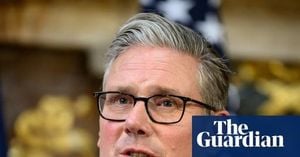The rising cost of living has become a pressing concern for many households across the United Kingdom, prompting the government to introduce several financial relief measures, including the new £200 Cost of Living Payment, effective from early 2025.
This initiative is geared toward helping families manage their daily expenses as inflation continues to surpass 7%, significantly impacting low-income families, pensioners, and single-parent households. Essential expenses like energy bills, housing costs, and food prices have surged, leaving many struggling to make ends meet.
Starting in 2025, the one-time payment aims to aid those most affected by the mounting financial pressures. Distributed through local councils as part of the Household Support Fund (HSF), this payment is expected to provide immediate relief, ensuring funds reach vulnerable populations efficiently.
"We recognize the financial strain many households are under, and this payment is part of our broader strategy to provide immediate relief and meet their needs," said Chancellor Rachel Reeves.
Eligibility for this payment is primarily determined based on household income and families' existing benefit status. Those eligible include recipients of various benefits, such as Universal Credit, Pension Credit, Child Tax Credit, and Income Support. Local councils will also have discretion to extend eligibility to families experiencing financial hardship, even if they do not receive benefits.
Communities will vary significantly; some councils may have different income thresholds depending on local living costs. For example, high-cost areas like London may impose different limits than smaller towns.
This payment is particularly important against the backdrop of surging prices. Energy bills have increased by over 50% since 2022, and families are now grappling with annual costs exceeding £1,800, largely due to the energy crisis prompted by global supply chain disruptions and geopolitical issues.
Food prices have also risen sharply, with staples seeing increases of 12% on average, worsened by inflation and living costs. Rents, too, have climbed significantly; urban areas have experienced rent increases of 16% over the last year, aggravation for those already feeling the pinch.
On March 2, 2025, rail fares will increase by 4.6%, adding another layer of financial strain for commuters. The rise was announced as part of the Autumn Budget and affects 45% of ticket prices across England, Scotland, and Wales, reflecting broader transportation costs amid inflation.
Further financial changes are set to arrive later in March, including important decisions from the Bank of England on interest rates during its meeting on March 20. Existing base rates influence everything from mortgage payments to savings accounts.
The Chancellor's Spring Budget will be another landmark event on March 26, where new tax and spending measures are to be outlined. The Chancellor’s comments are anticipated as tax hikes from the previous Autumn Budget raised concerns about economic recovery, especially amid sluggish growth.
Notably, the current tranche of the Household Support Fund will close on March 31, 2025. This fund, initially introduced to assist households during the pandemic, will see its funding wrap up after multiple extensions, reinforcing the urgency for qualifying households to apply for support before the deadline.
The Winter Fuel Payment for pensioners also sees its last call for claims on March 31, having undergone recent eligibility changes. Only those receiving Pension Credit and qualifying benefits will receive payments, contrasting earlier, broader eligibility guidelines.
Households relying on benefits such as Working Tax Credits or Housing Benefits must migrate to Universal Credit by the end of March, marking the end of legacy benefits. It’s imperative for affected individuals to act quickly to maintain their support.
Stamp duty changes are also on the horizon, with the current thresholds for first-time buyers scheduled to drop from £450,000 to £300,000 at the end of March, which could significantly increase costs for many prospective homeowners.
Overall, these financial changes and support measures reflect the UK government’s response to the growing economic challenges families face. For those eligible for the £200 Cost of Living Payment or other forms of assistance, it is advised to stay informed about local application processes and eligibility determinations, as every penny counts during these trying times.
The £200 Cost of Living Payment, alongside these other initiatives, aims to bolster households against the formidable wave of financial pressures currently inflaming everyday life.



